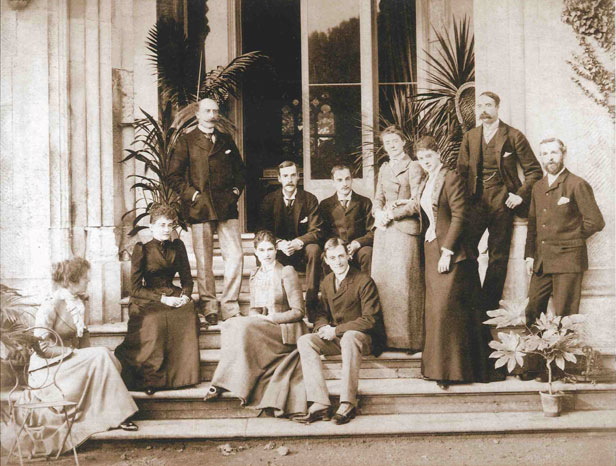
In this house party group at Highcliffe Castle in 1892, Ethel Smyth is fourth from the right. The Duke of Connaught is standing on the left with the Duchess in front of him. Edward Stuart Wortley is seated to the right of the Duke, with his wife Violet in front of him. © Ian Stevenson Collection
Highcliffe Castle can join in the renewed interest in the old “Votes for Women” campaign sparked off by the release of the film ‘The Suffragette’, starring Meryl Streep.
The composer Ethel Smyth, whose The March of the Women became in 1911 the anthem of the suffrage movement, was a friend of Edward and Violet Stuart Wortley. A year after Edward inherited the Castle in 1891, he invited Ethel to a weekend party at which the guests included the Duke and Duchess of Connaught, the son and daughter-in-law of Queen Victoria.
In her autobiography ‘As Time Went On’, Ethel says she tuned herself up ‘for the beauties and elegances of Highcliffe, which more than came up to expectation’.
Although Ethel found it easier to have romantic passions for women rather than men, she admitted that Edward Stuart Wortley was one of only two or three men that she found so attractive ‘that I should vaguely have liked to sit on his knee, though … this was the limit of my inclinations’.
The Stuart Wortleys enjoyed Ethel’s company when Edward’s Army duties took them to Aldershot. His wife Violet recalled: ‘She would arrive at our house for tennis in the afternoon, then slip off her outer garment and unpin an evening frock which enabled her to appear (more or less) suitably dressed at the dinner-table. After the repast she would sit down to the piano and, cigarette in mouth, improvise ad. lib. She was an orchestra and vocalist at thee same time – great fun’.
The friendship was later broken off due to Ethel’s activities with the suffrage movement, which included a two-month prison sentence for breaking the windows of anti-suffrage politicians. When her fellow composer Thomas Beecham went to visit her in Holloway Prison, he found suffragettes marching and singing in a courtyard while Ethel leaned out of a window, conducting them with a toothbrush.
Ethel’s militant antics shocked Edward Stuart Wortley’s ideas of law and order, said his wife Violet. She added: ‘I wondered sometimes whether the self-esteem of the artist, labouring under a sense of insufficient recognition, was the reason for this outburst of anti-social activity. The musical composer did not perhaps achieve the popularity she though herself entitled to’.
Ethel, whose works included chamber pieces, symphonies, choral works and operas, did receive official recognition, despite her suffragette activities. She was made a dame in 1922.






